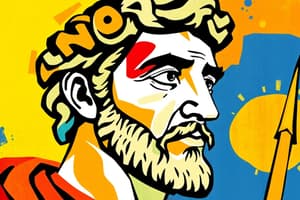Podcast
Questions and Answers
What action do the conspirators take with Caesar's blood?
What action do the conspirators take with Caesar's blood?
- They wash their hands with it.
- They attempt to conceal it.
- They bathe their hands in it. (correct)
- They use it as a weapon.
What does Brutus assure Antony regarding his intentions?
What does Brutus assure Antony regarding his intentions?
- He regrets their decision to kill Caesar.
- He will harm none of the conspirators.
- The motives stemmed from sympathy for the Roman populace. (correct)
- They acted cruelly despite their true feelings.
What does Antony express upon seeing Caesar's body?
What does Antony express upon seeing Caesar's body?
- Disgust at the conspirators.
- Fear of the conspirators' power.
- A desire to take revenge.
- Wonder at the contrast between Caesar's greatness and his lifeless state. (correct)
How does Cassius feel about Antony's potential alliance?
How does Cassius feel about Antony's potential alliance?
What does Antony ask from Caesar's spirit?
What does Antony ask from Caesar's spirit?
What does Caesar mean when he says, 'What touches us ourself shall be last served'?
What does Caesar mean when he says, 'What touches us ourself shall be last served'?
What is the first action taken against Caesar by the conspirators during the assassination?
What is the first action taken against Caesar by the conspirators during the assassination?
How does Caesar describe his constancy when refusing to change his decisions?
How does Caesar describe his constancy when refusing to change his decisions?
What was Artemidorus's intention when he approached Caesar?
What was Artemidorus's intention when he approached Caesar?
What is the significance of Brutus’s involvement in Caesar’s death?
What is the significance of Brutus’s involvement in Caesar’s death?
Flashcards are hidden until you start studying
Study Notes
Setting the Scene
- Artemidorus and a soothsayer wait for Caesar, foreshadowing the impending tragedy.
- Caesar enters accompanied by key figures, including Brutus, Cassius, and Antony, illustrating his political support and the tension of the moment.
Artemidorus's Warning
- Artemidorus approaches Caesar with a letter warning of imminent danger, prioritizing Caesar’s safety over all else.
- Caesar dismisses Artemidorus, indicating arrogance and a lack of awareness of the threat, stating, “What touches us ourself shall be last served” (III.i.8).
Entry into the Senate
- The conspirators express concern over the potential discovery of their assassination plot.
- Trebonius distracts Antony, indicating a strategic decision to isolate Caesar.
Pleas to Caesar
- Metellus Cimber pleads for the return of his banished brother; Caesar’s refusal highlights his adherence to the law and personal convictions.
- Caesar compares his steadfastness to the “Northern Star” (III.i.60) and likens swaying him to lifting Olympus (III.i.74), solidifying his image of unyielding authority.
The Assassination
- The conspirators attack Caesar, beginning with Casca, culminating in Brutus’s betrayal, “Et tu, Brute?” (III.i.76)—a powerful moment emphasizing loyalty and betrayal.
- Caesar dies, marking the end of his rule and the rise of the conspirators' resolve for liberty.
Aftermath of the Assassination
- The conspirators celebrate their act, viewing it as a triumph for freedom.
- Brutus encourages them to display their bloody hands as proof of their commitment to peace and liberty, illustrating manipulation of public perception.
Brutus and Cassius's Alliance
- Amid the chaos, Brutus assures that they acted in friendship towards Caesar, despite the brutality of their actions.
- Cassius expresses doubt about Antony's loyalty, foreshadowing future conflict.
Antony's Reaction
- Antony, upon seeing Caesar’s corpse, reflects on Caesar’s greatness contrasted with his fate, establishing a theme of lost potential and tragedy.
- Antony’s initial mockery of the conspirators suggests an undercurrent of resentment and foreshadows his future vengefulness.
Manipulation and Strategy
- Antony's rhetoric aims to gain favor with the conspirators while secretly planning his revenge.
- His cunning involves shaking hands with the conspirators, blending blood to symbolize a temporary alliance while masking his true intentions.
Antony’s Promise
- He positions himself as a friend to the conspirators, portraying his grief over Caesar's death and setting the stage for the battle between him and Brutus.
- Dramatic irony unfolds as he plots to turn public sentiment against the conspirators, using his emotional manipulation to seek vengeance later.
Studying That Suits You
Use AI to generate personalized quizzes and flashcards to suit your learning preferences.




